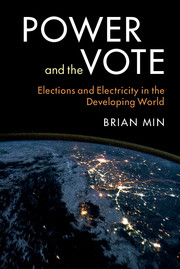Book contents
- Frontmatter
- Dedication
- Contents
- List of Figures
- List of Tables
- Acknowledgments
- 1 Introduction
- 2 Public Goods, Elections, and the Poor
- 3 Power and the State
- 4 Measuring Electricity from Space
- 5 Democracy and Light
- 6 Lighting the Poor
- 7 Electrifying India
- 8 Conclusion
- Appendix Satellite-Derived Estimates of Electrification
- References
- Index
7 - Electrifying India
Published online by Cambridge University Press: 05 November 2015
- Frontmatter
- Dedication
- Contents
- List of Figures
- List of Tables
- Acknowledgments
- 1 Introduction
- 2 Public Goods, Elections, and the Poor
- 3 Power and the State
- 4 Measuring Electricity from Space
- 5 Democracy and Light
- 6 Lighting the Poor
- 7 Electrifying India
- 8 Conclusion
- Appendix Satellite-Derived Estimates of Electrification
- References
- Index
Summary
Introduction
In the developing world, whether or not one has access to public goods such as electricity, clean water, or education is largely determined first, by the decision of governments to provide them, and second, by the strategies employed by political actors in delivering them. Chapters 5 and 6 have underscored the broader provision of public goods to the less advantaged in democratic settings, showing that democracies provide broader access to electricity, even among the poorest segments of their countries. This chapter seeks to better illuminate the process by which public goods, which are often wrapped in a universalist veneer when they are proposed, are manipulated by political actors who shape their delivery in the pursuit of electoral payoffs.
More people in India lack electricity than in any other country in the world, and nowhere more so than in the state of Uttar Pradesh (UP), where an estimated 60 million people have no electrical connection at home. Electricity is desired everywhere because it improves quality of life and enables economic development. Yet Uttar Pradesh lacks the electricity supply to provide to all who need or want it, and thus its distribution must be heavily rationed through ubiquitous power cuts that impose steep costs on both citizens and businesses.
Using evidence from satellite imagery over time, I demonstrate that governments in India are motivated by political incentives to manipulate the distribution of electricity. In a context where access to electricity is fundamentally supply constrained, I use detailed local-level evidence collected over nearly two decades to show that electricity provision follows a cycle in which more villages enjoy stable access to electricity in periods around elections than during nonelection periods.These election period effects are highest in areas represented by parties whose platforms and ideological commitments are credibly served by targeting public services to poor and rural areas.
The analysis draws on annual composite imagery of the earth at night that enable detection of electricity availability to all 98,000 villages in UP in each year from 1992 to 2010. The timeframe captures a period of dramatic political change in UP, particularly due to the emergence of the low-caste Bahujan Samaj Party (BSP), whose core support lies primarily among poor and rural Scheduled Caste (SC) voters.
- Type
- Chapter
- Information
- Power and the VoteElections and Electricity in the Developing World, pp. 125 - 159Publisher: Cambridge University PressPrint publication year: 2015



